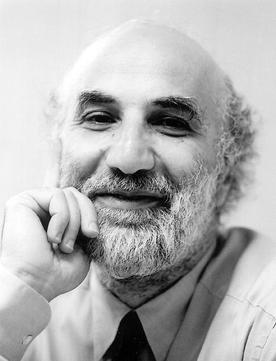Fouad Ajami facts for kids
Quick facts for kids
Fouad Ajami
فؤاد عجمي |
|
|---|---|
 |
|
| Born | September 18, 1945 Arnoun, Lebanon
|
| Died | June 22, 2014 (aged 68) Maine, United States
|
| Nationality | Lebanese and American |
| Alma mater | Eastern Oregon College University of Washington |
| Occupation | professor, writer |
| Known for | proponent of Iraq War |
|
Notable work
|
|
| Spouse(s) | Michelle |
| Awards | MacArthur Fellowship (1982) National Humanities Medal (2006) Bradley Prize (2006) Benjamin Franklin Award for public service (2011) Eric Breindel Award for Excellence in Opinion Journalism (2011) |
| Scientific career | |
| Institutions | Johns Hopkins University, Hoover Institution & Princeton University |
Fouad A. Ajami (Arabic: فؤاد عجمي; September 18, 1945 – June 22, 2014) was a well-known Lebanese-American university professor and writer. He was an expert on issues related to the Middle East. He also won a special award called the MacArthur Fellowship.
Ajami was a senior fellow at Stanford University's Hoover Institution. He strongly supported the Iraq War. He believed it was a "noble war" and a "gift" for the people of Iraq.
Contents
Early Life and Education
Fouad Ajami was born in Arnoun, a small village in southern Lebanon. His family belonged to the Shia Muslim faith. His great-grandfather had moved to Arnoun from Tabriz, Iran, in the 1850s.
The word "Ajam" in Arabic means "non-Arab" or "Persian." Ajami came to the United States in 1963, just before his 18th birthday. He studied at Eastern Oregon State College, now called Eastern Oregon University. He then went to the University of Washington for his advanced studies. There, he earned his PhD by writing about international relations and world government.
Career Highlights
Working in Academia
In 1973, Ajami began working at Princeton University in the politics department. He became known for supporting the idea of Palestinian self-rule. In 1980, he became the director of Middle East Studies at Johns Hopkins University. Later, in 2011, he joined the Hoover Institution.
Working with Government
Ajami also served as an advisor to important government officials. He advised United States Secretary of State Condoleezza Rice. He was also a friend and colleague of Paul Wolfowitz, another key figure in government.
Writing for Newspapers and Magazines
Ajami often wrote articles about the Middle East and world history. His writings appeared in famous publications like The New York Times Book Review and The Wall Street Journal. He also contributed to magazines such as Foreign Affairs and The New Republic.
Appearing on Television
Fouad Ajami was a frequent guest on many television news channels. He appeared on PBS, CBS, CNN, and Fox News. This allowed him to share his knowledge with a wider audience.
Books and Ideas
In 1981, Ajami published his first book, The Arab Predicament. This book looked at the challenges and problems in the Arab world. He wrote about the intellectual and political difficulties after the 1967 Six-Day War with Israel.
He wrote several other books, including Beirut: City of Regrets (1988) and The Vanished Imam (1986). His book The Dream Palace of the Arabs: A Generation's Odyssey (1998) explored the ideas and thoughts in the Arab world and Iran. He also wrote The Foreigner's Gift (2006), which was about the American invasion of Iraq.
A book called Crosswinds: The Way of Saudi Arabia was published after his death in 2020.
His Views and Philosophy
Thoughts on "Clash of Civilizations"
Fouad Ajami had interesting ideas about how different cultures and countries interact. He responded to a famous idea by Samuel P. Huntington called "The Clash of Civilizations?" Huntington suggested that after the Cold War, the world would be divided by major civilizations. He thought these cultural differences would cause conflicts.
Ajami disagreed with some of Huntington's points. He believed that countries would still act based on their own interests. He also thought that modern ways of life and non-religious ideas would continue to be important. Ajami argued that countries control civilizations, not the other way around. However, later in his life, Ajami admitted that Huntington's idea of a "clash" seemed more accurate to him.
Support for the Iraq War
Ajami was a strong supporter of the Iraq War. He believed the war came from a deep frustration in America with terrorism. He felt that terrorism had grown in Arab lands.
In 2002, US Vice President Dick Cheney quoted Ajami. Cheney said that Ajami predicted people in Iraq would celebrate the American arrival. Ajami continued to view the war positively even years later. In a 2006 book, he called it a "noble effort." He argued that it was too early to call it a failure, despite its problems.
Death
Fouad Ajami passed away on June 22, 2014. He was 68 years old and died from prostate cancer at his summer home in Maine.
Awards and Recognition
Ajami received many awards for his work. In 1982, he won the MacArthur Prize Fellowship. This is a very special award given to talented people in arts and sciences. In 2006, President Bush gave him the National Humanities Medal. He also received the Bradley Prize that year. In 2011, he earned the Benjamin Franklin Award for public service and the Eric Breindel Award for Excellence in Opinion Journalism.
Memberships
Ajami was a member of several important groups. He was on the Board of Directors for the Council on Foreign Relations. He also served on the Board of Advisors for the journal Foreign Affairs. Ajami helped start ASMEA (The Association for the Study of the Middle East and Africa). He was also a senior fellow at the Hoover Institution.
 | Selma Burke |
 | Pauline Powell Burns |
 | Frederick J. Brown |
 | Robert Blackburn |

